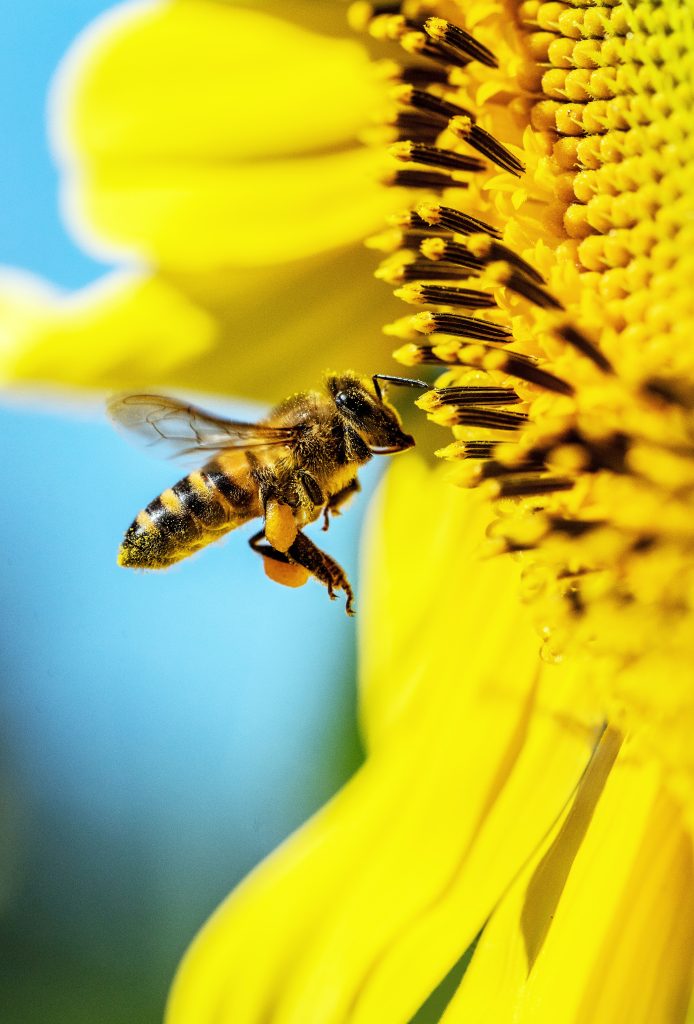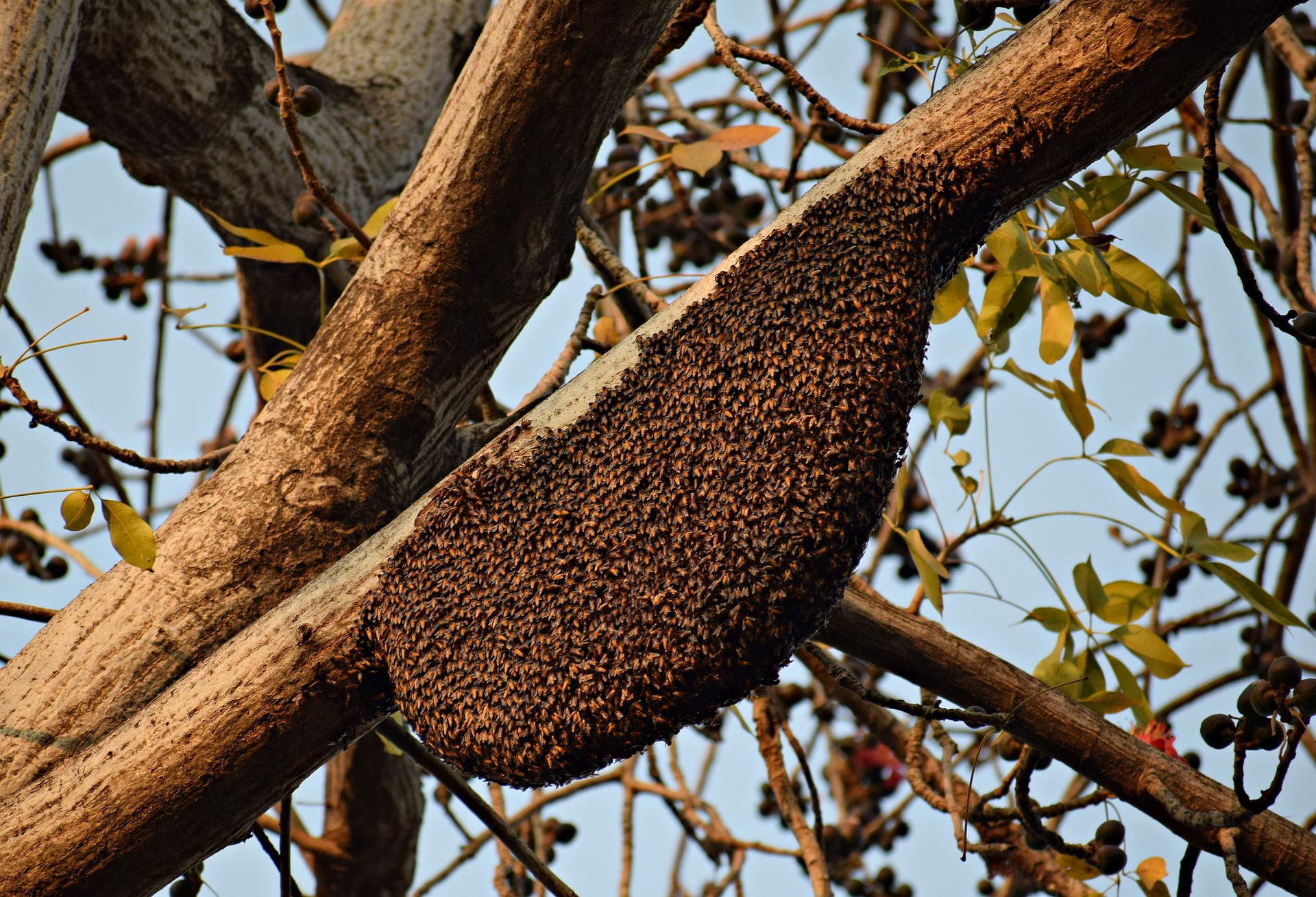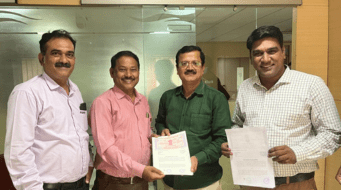~ by Imran Khan YD and Saurabh Purohit
This blog is supported by HSBC Software Development (India) Private Limited under the ‘Nature-based Solutions for Sustainable Rural Landscapes and Climate Resilience’.

“I have a huge belief in the importance of bees, not just for their honey, which is a healing and delicious food, but the necessity of bee colonies that are vital to the health of the planet ” – Trudie Styler
Today, May 20th, marks the celebration of World Bee Day. This day pays tribute to Anton Janša, a key figure in modern beekeeping and a trailblazer in the world of apiculture. The aim of World Bee Day is to emphasize the essential role pollinators like bees play. They keep our food systems running, maintain our ecosystems, and contribute to our economy. The message of this day also includes taking measures to protect these valuable creatures and their environments. In line with this mission, the theme for 2023 is “Bee Engaged in Pollinator-Friendly Agricultural Production”.
Let’s use this day to appreciate the extraordinary contributions of bees and make efforts to preserve their habitats.
Pollination Unveiled: The Intricate Dance of Nature’s Essential Workers
Today, let’s dive into the magical world of pollination. Imagine pollen grains as little passengers hopping on from a flower’s male part, the anther, to its female part, the stigma (as shown below). This is how plants start their life cycle, and it’s pretty crucial.
Animal pollinators, like bees, butterflies, or even bats, play a big role in this process. Believe it or not, around 30% of the world’s total food production relies on these busy creatures (Khalifa et al. 2021). Bees alone hold the trophy for helping create about a third of the food we humans eat!
But it’s not just about food. Pollinators are super important for the reproduction and growth of many plant species (Katumo et al. 2022). Their work maintains the planet’s biodiversity and keeps the ecological balance in check. From tiny insects like bees, moths, butterflies, hoverflies, wasps, and thrips to birds and bats, every pollinator is a hero in this amazing process.

The Indispensable Buzz: Why Bees and Pollinators Matter
-
Food Systems – Food security

Why should we be concerned about bees and other pollinators? The answer is quite straightforward. These creatures serve as crucial actors in our food system, assisting crops through their pollination activity, essentially distributing pollen amongst plants. Remarkably, between 75% and 95% of the world’s flowering plants rely on these pollinators to prosper (Ollerton, Winfree, and Tarrant 2011).
Now, imagine the consequences without the diligent work of bees and their counterparts. Many crops would find it challenging to yield fruits, seeds, and nuts, resulting in diminished food availability, compromised quality, and reduced harvest quantities.
The repercussions on our food system could be severe. Potential food shortages, an increase in food prices, and a deterioration in food nutritional value are all plausible outcomes in the absence of pollinators. Therefore, it’s fitting to appreciate bees and other pollinators for their invaluable role in keeping our food supply abundant and nutritionally rich.
-
Livelihoods
Beyond their ecological impact, pollinators also have a significant role in supporting the livelihoods of farmers and food producers around the globe. A report by the Intergovernmental Science-Policy Platform on Biodiversity and Ecosystem Services (IPBES) sheds light on this crucial aspect.
According to the report, pollinators contribute to the livelihoods of roughly 2 billion smallholder farmers, herders, and pastoralists worldwide. It’s not just about nature and biodiversity; these pollinators help ensure the economic well-being of vast numbers of people globally.
So, while we appreciate pollinators for their essential role in sustaining ecosystems, we should also acknowledge their vital contribution to agriculture and livelihoods. They truly make our world a better place.
-
Sustainable Development Goals (SDGs)
Pollinators are integral to the achievement of the United Nations’ Sustainable Development Goals (SDGs), a collection of 17 global targets aiming to create a sustainable, equitable future for all.
Consider SDG 2, a goal focused on eradicating hunger and fostering sustainable agriculture. Pollinators, through their contribution to crop production—especially of fruits, vegetables, and nuts—play a pivotal role in promoting balanced diets and food security. Their absence would drastically affect agricultural productivity.
Moreover, pollinators are vital to SDG 15, aimed at conserving biodiversity. By facilitating the pollination of a wide array of plant species, these organisms sustain healthy ecosystems and the various life forms reliant on these habitats.
Aside from their role in specific SDGs, the preservation of pollinators is crucial for the overarching mission of the 2030 Agenda for Sustainable Development, which strives for sustainability and equality. Acknowledging the fundamental role of pollinators in realizing the SDGs can guide policymakers and individuals alike in advocating their conservation and supporting agricultural practices that benefit both humanity and the environment.
Endangered Pollinators: Grappling with the Consequences of Biodiversity Loss

Pollinators such as bees, butterflies, moths, birds, and bats are currently under threat. Their populations are seeing a worrisome decline worldwide, which could have serious implications for both our agricultural systems and the health of our ecosystems.
- One of the primary dangers pollinators face is habitat loss. As we continue to convert natural spaces into farmland or urban areas, these vital creatures are losing the environments they need to thrive.
- Another significant threat comes from pesticide use. Many of these chemicals are toxic to pollinators. They can cause direct harm or contaminate pollinators’ food sources, leading to harmful indirect effects.
- Climate change further adds to the challenges facing pollinators. Changes in temperature and rainfall patterns can disrupt the timing of flower blooming and migration events. This disarray can disturb the critical relationship between plants and their pollinators.
The implications of losing our pollinators could be profound. A stark example lies with tropical crops, many of which heavily depend on pollinators (Sritongchuay et al. 2022). A decline in pollinator populations can trigger food shortages and price hikes. Moreover, such a loss could send shockwaves through ecosystems, as many plant and animal species rely on pollinators for survival. We must, therefore, urgently address these threats to safeguard our pollinators, our food systems, and our ecosystems.
Buzz-worthy Actions: How to Make a Difference for Pollinators

There are plenty of ways you can pitch in to help pollinators and celebrate World Bee Day. Here are a few ideas:
- Plant Native Plants: Native plants are like a food haven for pollinators. Try adding a splash of color to your garden with some native wildflowers. You’ll be helping out the pollinators and beautifying your space.
- Skip the Pesticides: Pesticides can be really harmful to pollinators, so it’s best to avoid them if you can. If you really need to use them, make sure you pick ones labeled as safe for bees and other pollinators.
- Offer Nesting Sites: Bees, butterflies, and other pollinators need safe places to nest and lay their eggs. You can help by providing areas of bare ground, dead wood, or even a few nesting boxes.
- Support Local Beekeepers: When you buy honey from local beekeepers, you’re supporting your local economy and sustainable beekeeping practices.
- Spread the Word: Conduct or attend workshops and training programs about pollinators. The more we learn and share about these hard-working creatures, the better we can help them.
Remember, every small action you take can make a big difference for pollinators and our environment.
Embracing Research and Innovation to Preserve Pollinators
Given the crucial role of pollinators, we’re seeing more and more research and innovation in preserving and managing them sustainably. Scientists are trying to figure out why pollinator populations are declining, looking at things like pesticides, habitat loss, and disease. They’re also coming up with strategies to tackle these threats.
Researchers aren’t stopping there. They’re exploring how cutting-edge tech like gene editing and precision agriculture might help protect pollinators and boost farming productivity.
In addition to research, there are loads of cool initiatives aimed at helping pollinators. For instance, some farmers are adding flowering cover crops to their fields to give pollinators more food and places to live (Candelaria-Morales et al. 2022; Wilson et al. 2018). Others are using precision farming methods to cut down on pesticide use and reduce their impact on pollinators (Fincham et al. 2023; Ratnayake et al. 2023).
There are also community-led programs that get people involved in planting pollinator-friendly gardens and creating habitats for pollinators in cities.
The future of pollinators will depend on our ability to come up with new ways to look after their health and well-being. By embracing research and innovation, we can help protect these vital creatures and ensure a sustainable future for farming and our ecosystems.
This is why celebrating World Bee Day and raising awareness about the role of pollinators in our ecosystem is so important. By looking out for and supporting pollinators, we’re helping to ensure a sustainable future for our planet.
Biodiversity is an integral element of Ecosystem-based Adaptation, the approach WOTR uses to rejuvenate communities and ecosystems systemically, sustainably and at scale. WOTR has also been strongly working in the area of green livelihoods, offering rural communities a pathway to resilient and sustainable incomes. To partner with WOTR on biodiversity conservation write in to madhavi.kadrekar@wotr.org.in
References
- Candelaria-Morales, Naomy P, Julie Grossman, Adria Fernandez, and Mary Rogers. 2022. “Exploring Multifunctionality of Summer Cover Crops for Organic Vegetable Farms in the Upper Midwest.” Renewable Agriculture and Food Systems 37(3): 198–205.
- Fincham, William N W, John W Redhead, Ben A Woodcock, and Richard F Pywell. 2023. “Exploring Drivers of Within-Field Crop Yield Variation Using a National Precision Yield Network.” Journal of Applied Ecology 60(2): 319–29.
- Katumo, Daniel Mutavi et al. 2022. “Pollinator Diversity Benefits Natural and Agricultural Ecosystems, Environmental Health, and Human Welfare.” Plant Diversity 44(5): 429–35.
- Khalifa, Shaden A M et al. 2021. “Overview of Bee Pollination and Its Economic Value for Crop Production.” Insects 12(8).
- Ollerton, Jeff, Rachael Winfree, and Sam Tarrant. 2011. “How Many Flowering Plants Are Pollinated by Animals?” Oikos 120(3): 321–26.
- Ratnayake, Malika Nisal et al. 2023. “Spatial Monitoring and Insect Behavioural Analysis Using Computer Vision for Precision Pollination.” International Journal of Computer Vision 131(3): 591–606.
- Sritongchuay, Tuanjit et al. 2022. “Landscape-Level Effects on Pollination Networks and Fruit-Set of Crops in Tropical Small-Holder Agroecosystems.” Agriculture, Ecosystems & Environment 339: 108112.
- Wilson, Houston et al. 2018. “Summer Flowering Cover Crops Support Wild Bees in Vineyards.” Environmental Entomology 47(1): 63–69.





